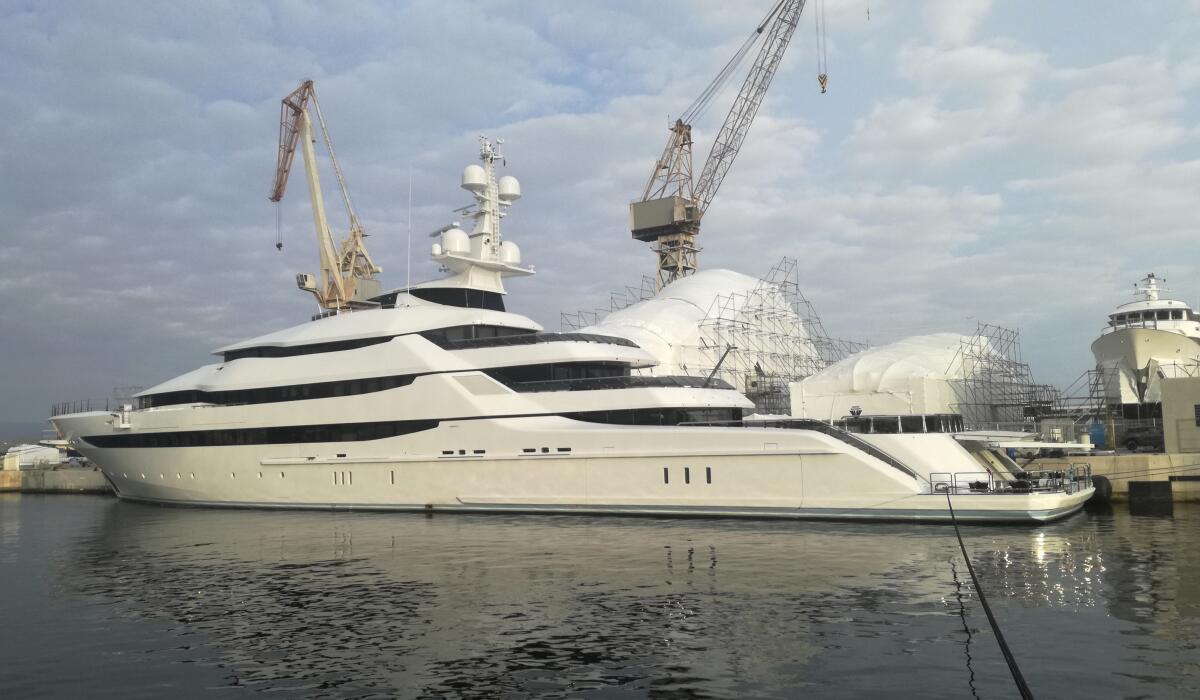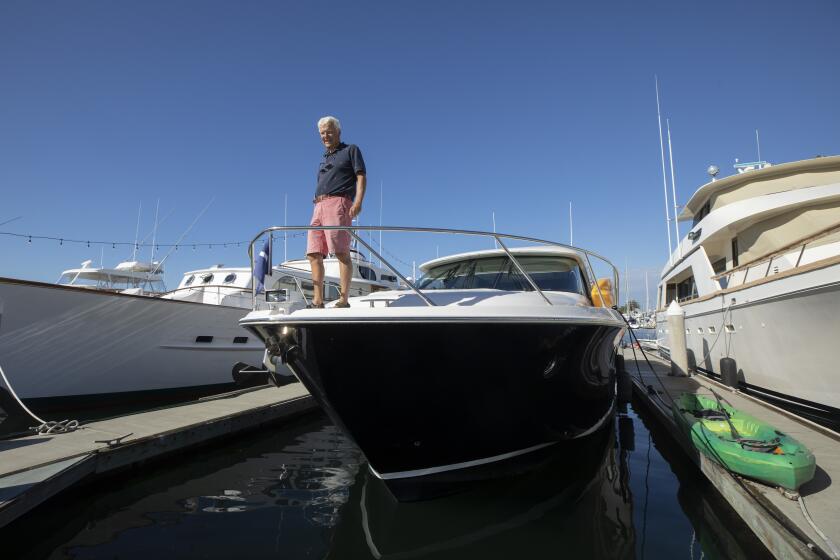Where do you hide a 500-foot yacht? Asking for an oligarch

- Share via
It’s one thing to stuff cash under your mattress or move millions into an offshore bank account. Hiding a mega-yacht from multiple governments and a global mob of private citizens is a bit trickier.
To intensify sanctions on Russia and further throttle the finances of the Kremlin’s uber-wealthy allies, the Biden administration this week announced a “KleptoCapture” task force that is aggressively targeting Russian oligarchs by seizing real estate and other prized assets.
“We’re coming for you,” Deputy Atty. Gen. Lisa Monaco told Bloomberg. “We’re coming for your yacht. We’re coming for your jet.”
Other countries are imposing similar measures, setting off a global game of hide-and-seek on the high seas as Russian billionaires hastily attempt to move their boats to havens such as the Seychelles and the Maldives, where at least one oligarch-owned super-yacht has already arrived; tracking data show several others on their way.
On Friday, Italian police said they had impounded Lady M Yacht, owned by Alexei Mordashov, Russia’s richest man, in Liguria as part of the European Union’s sanctions against him. A day earlier, French authorities said they had seized a yacht linked to Igor Sechin, a Russian oil tycoon and ally of President Vladimir Putin. The vessel, named Amore Vero, was docked in the coastal town of La Ciotat for repairs. When French customs officials arrived for an inspection, its crew “was preparing an urgent departure,” according to the Associated Press.
Evading authorities takes some savvy — and foresight.
Although boats must be registered, many high-profile customers don’t use their names when they buy one, said Ron Filipkowski, a former federal prosecutor who specialized in asset forfeitures.
“Most of them are in corporations’ names and other people’s names, not the oligarchs themselves,” said Filipkowski, now a defense attorney in Sarasota, Fla. “That’s typically what these people do — put a third party between the law and them so if anything happens, they’ll say, ‘It’s not in my name, technically it belongs to so and so.’”
That can create complications when authorities try to determine ownership, as is the case in Germany, where officials on Thursday disputed a report that they had seized Alisher Usmanov’s 512-foot mega-yacht in Hamburg after the Russian billionaire was sanctioned by the European Union. A spokesperson told the AP that the Dilbar, valued at nearly $600 million, was registered to a holding company in Malta.
The Russian president is believed to be very wealthy, but his assets are in the name of relatives, associates and friendly oligarchs.
Other tricks include bypassing the numerous vessel tracking sites — among them MarineTraffic and VesselFinder — that keep tabs on ships’ whereabouts in real time. Normally, if you know the name of a boat, you can trace it, thanks to the satellite-powered Automatic Identification System, which monitors the movements of ships around the world.
“But you can turn that system off — everything just blanks out. I know big yachts do it,” said Brad Fisher, a broker with Naos Yachts in Oxnard. “I ran a big yacht from Virginia Beach down to Lauderdale, and then Lauderdale to the Bahamas, and you just turn it off if you don’t want people knowing who’s on board and all that.”
Typically, the “really sketchy” maneuvers are carried out by subcontracted boat captains at the behest of owners, Fisher said.
“When those Russians have a lot of money and can pay a captain cash, he’s going to probably do it and move that vessel for him,” he said. “They’re going to move at night when it’s pitch black. They’re going to turn everything off, they’re going to run blind, they’re going to shut all their electronics off so they can’t receive radio contact.”
Yacht brokers say demand is through the roof, with little to no inventory and multi-month wait lists.
Russians accounted for 9% of all super-yacht owners last year, the second-largest ownership country behind the U.S., according to a report this week by SuperYacht Times.
“Clearly their financial contribution to the industry is significant,” said the trade publication, noting an “ethical question” about whether ship builders will continue to work with Russian owners.
Complicating matters is that boat manufacturers sometimes “don’t even know who they’re building for,” said Sarah Salvatori, a spokeswoman with the National Marine Manufacturers Assn. “It’s very, very private.”
Brokers declined to discuss if they had boats under contract to Russian oligarchs — yacht sales have boomed during the pandemic, and the wait time between purchase and new boat delivery can stretch several months — and what would become of deals that were already underway.
“Burgess is complying with all regulations and sanctions being put into action across the territories we work in,” a spokesperson for the luxury yacht broker said. “We comply to all the rules and regulations that the governments have imposed, which are ever changing right now as the situation worsens.”
Adding to yacht owners’ problems: Private citizens are taking matters into their own hands.
Over the weekend, Ukrainian yacht mechanic Taras Ostapchuk tried to sink Lady Anastasia, the $7-million yacht he was working on, in Mallorca. He was arrested and reportedly told authorities that he was upset at the thought that missiles striking Kyiv might have been supplied by the yacht’s owner, a Russian arms tycoon.
“It’s so visceral for people. Nothing seems to stir people’s emotions like a Russian oligarch’s yacht seizure story,” said Filipkowski, the former prosecutor and an ex-Marine. “When I saw that they were going to let private citizens maybe do it for bounties or something, that’s when I was like, ‘Hmm, well, maybe instead of going over there and getting bombed in Ukraine, maybe that would be a cooler job for an ex-military guy: Seize a yacht.’ ”
That’s easier said than done, though, because the kind of wealth that buys mega-yachts can also make them disappear.
“When you’ve got lots of money, you can do lots of silly things that hide things,” said Fisher, the Naos Yachts broker. “There’s a lot of water out there.”
More to Read
Inside the business of entertainment
The Wide Shot brings you news, analysis and insights on everything from streaming wars to production — and what it all means for the future.
You may occasionally receive promotional content from the Los Angeles Times.













